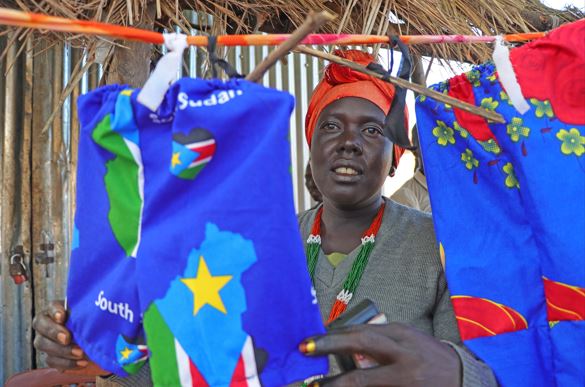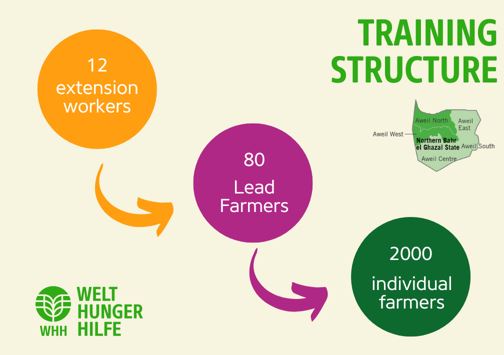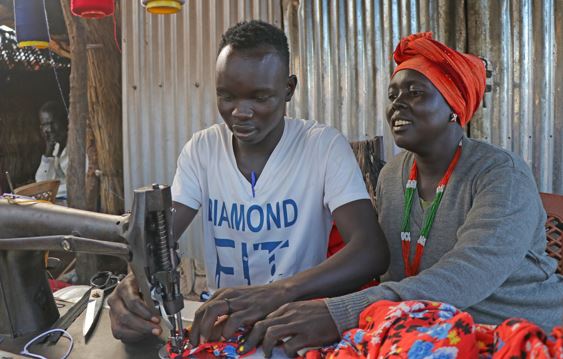The “Boosting Climate-Sensitive Local Food Systems” project, implemented by Welthungerhilfe (WHH) in partnership with the South Sudan Agriculture Producers Union (SSAPU) and funded by the German Federal Ministry for Economic Cooperation and Development (BMZ), has made significant strides in improving food security and resilience in Northern Bahr el Ghazal, South Sudan.
Over three years, the project has enhanced the livelihoods of approximately 4,000 households through interventions combining climate-sensitive agricultural practices, market access, and skills development, reinforcement of farmers’ cooperatives, and rehabilitation and maintenance of crucial infrastructure. Communities are now more confident when facing challenges such as flooding and droughts that frequently disrupt local food systems, as witnessed by the recent floods that have affected over 280,000 people in the state.
Stronger market systems for better incomes and savings
In 2022, the project conducted a comprehensive study on the region’s agricultural potential, identifying six value chains—simsim (sesame), sorghum, groundnuts, okra, livestock (goats and cattle), and fish. These value chains have become the foundation of a more vibrant local economy. The Farmer Field Schools, training, cooperatives, and infrastructure set up through the project helped to connect local producers to market opportunities, ensuring that their hard work translates into economic benefits for their families and the broader community.
The overwhelming majority of participants saw at least a 25 percent increase in their income as a direct result of the knowledge and skills gained through the project, both in the domain of farming and business. Three-quarters of participants indicated project-related activities, especially farming, as the main source of their savings.
Training has also played a major role in boosting incomes. The project provided vocational training on practical trades like masonry, blacksmithing, tailoring, and motorbike repairs to over 200 young people, alongside business development courses for 900 producers. These initiatives have not only equipped participants with the practical skills needed to navigate the local economy but also positioned them as drivers of economic growth in their communities.
The case of Achot Wol Wol deserves to be brought to the spotlight. She attended training in tailoring from March to June 2023 and received a sewing machine upon completion. She then set up a small stall at Nyamlel Dit market. Initially, she was only able to purchase colorful bed sheets and second-hand clothing, as larger fabrics were too expensive. She made ready-to-wear clothes from bed sheets and adjusted second-hand clothes to re-sell them.

One year later, with earnings from her activity saved through a VSLA scheme, she bought her sewing machine and hired and trained two young men. Today, one of the young men runs a small tailoring business in Nyamlel Dit market; the other one is an apprentice at a second stall in Nyamlel Marol Akhon Market. The business is running so well that Achot has been able to devote time to farming – her ambition is to feed her family of seven with produce coming from her land.
“Everything we do here is about food”, she explains. “If you have a business and use what you earn only to buy food, the business will collapse”.
That is why Achot has been careful to divide her savings among household and food expenses, as well as maintenance of the sewing machines and re-stocking of materials. She is reinvesting most of her profits into the tailoring business, watching it grow. In the future, Achot plans to rent an indoor space at the market to store and display goods more safely. She also wants to permanently hire the youth she has been training, so they can keep running the tailoring shop while she can spend more time taking care of her land.
Food security: from home sustenance to profitable sales and investment
A key component of the project has been the promotion of climate-adapted agriculture through 80 Farmer Field Schools. Farmers were encouraged to adopt practices like early land preparation, crop rotation, row planting, and organic pest management. This has led to a steady increase in agricultural yields and, consequently, availability of more varied food throughout the year.
Yel is a Lead Farmer at a Farmer Field School in Ayak Hong (Aweil West), in charge of training 25 fellow farmers. Before the start of the project, he had a small piece of land that he cultivated to feed his family of seven. He was doing well, but he knew farming had the potential to be upscaled – both for him individually and within the community.
After being trained by extension workers, he began conducting training in a demo plot and a tukul set up by WHH for the purpose. Besides the members of the Farmer Field School, up to 300 households in Yel’s village have taken up the techniques that he has been promoting as part of the training. This addresses challenges reported by farmers themselves, such as crop spacing, identifying the best time for planting and harvesting, and increasing yields to go beyond home sustenance.
Rebeka, a farmer trained by Yel, explained that in 2021 the vegetable production in the area had been enough to feed farmers’ families. In 2022, when the project kicked off, it reached the level of surplus – that’s when farmers started making profits by selling their produce at the market. Between 2023 and 2024, they started investing the money from sales into VSLAs promoted by the project.
As for Yel himself, he now cultivates three feddans of groundnut and two feddans of sorghum. He produces enough food not only for his family, but to invest in livestock (goats) and to set money aside in the VSLA he is part of.
Resilience to increasingly extreme weather events
An important part of the Farmer Field Schools training covered understanding how weather forecasts impact decisions on when to plant and how to prepare and select the land. Climate-adapted practices, in particular early land preparation and row planting, have become widespread among farmers, leading to an increase in agricultural production year after year – combined with reduced damage linked to weather events: the percentage of households reporting losses due to flooding has decreased from 71% to 64%.
Garang, a 49-year-old farmer, has observed the impact of changing weather patterns throughout the years. Since the 2000s, rains have been unpredictable: they start or end later than expected and, most worrying, they are no longer gradual, but they turned into heavy flash rains. Flooding due to rainwater, which was not common during Garang’s childhood, has become the norm. He now takes into account weather forecasts at the time of planting, but also when selling: for example, if the rain is late, he avoids selling all his produce so his family can rely on it for longer, without the risk of facing food insecurity. Moreover, he built a water channel around the four feddans of land that he cultivates near his house, to prevent damage from floodwaters.

A Future of Sustained Growth and Resilience
The project leaves behind fertile ground for sustained growth, setting a trajectory for continued increase in agricultural production and savings. “We gained knowledge and resources to improve our livelihoods and protect our crops from risks connected to the changing climate. We are now better prepared to make sure food is available for our families and communities,” shared a participant from Aweil West.
Although change is happening, it needs to be accelerated for communities to become truly self-reliant. As Paulino Longar, Senior Field Officer – Agriculture at WHH, puts it, “changing the food security situation is a collective responsibility”. WHH remains committed to working with partners and communities in South Sudan to build on these successes and continue driving progress towards sustainable food systems, improved food security and resilience.




